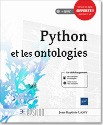Owlready2 0.2 has been released!
Owlready is a Python module for ontology-oriented programming. It can load OWL 2.0 ontologies and manipulate them transparently in Python.
The 2 - 0.2 version of Owlready now includes a RDF/XML written in Python. This parser can load big files rapidly.
The new version can be downloaded from PyPI (Python Package Index): https://pypi.python.org/pypi/Owlready2
Owlready2 0.1 has been released!
Owlready is a Python module for ontology-oriented programming. It can load OWL 2.0 ontologies and manipulate them transparently in Python.
The 2 - 0.1 version of Owlready is a full rewrite that integrates an optimized RDF quadstore. It can now load big ontologies (several millions of RDF triples).
It can be downloaded from PyPI (Python Package Index): https://pypi.python.org/pypi/Owlready2
Towards Owlready 2...!
Owlready is a Python module for ontology-oriented programming. The version 2 currently under development keep the functionalities of the first version, but now relies on an optimized RDF quadstore in SQL. This version is now able to load big ontologies (several millions of RDF triples) with good performances.
The development version of Owlready2 is available here: https://bitbucket.org/jibalamy/owlready2
ORMithorynque 0.1.1 has been released!
ORMithorynque is an ORM Python module (object database).
ORMithorynque 0.1.1 has been released and can be downloaded from PyPI (Python Package Index): https://pypi.python.org/pypi/ORMithorynque
Using Webex on ArchLinux
Webex is a videoconference system from Cisco. It works under Linux but it is only available in 32 bits... This tuto explains how to use it under ArchLinux 64 bits.
1- Install Firefox (32 bits), Java (32 bits) and Webex 32 bits dependencies
Install the 32 bits version of Firefox, Java, and the 32 bits libraries needed by Webex. For ArchLinux, you need to install AUR package bin32-firefox, bin32-jre, webex-meta.
2- Test Java in Firefox
Launch Firefox 32 bits and test the java installation from this page: https://java.com/en/download/installed8.jsp
If the Java plugin is not found by Firefox, verify the plugin presence (file /usr/lib32/mozilla/plugins/libnpjp2-jre8.so) and start Firefox after specifying the plugin directory, as following :
MOZ_PLUGIN_PATH=/usr/lib32/mozilla/plugins/ /usr/lib32/bin32-firefox/firefox32
3- Test Webex
Test Webex from this page : https://www.webex.com/test-meeting.html
Attention, seeing the interface is not enough to garantee that everything is OK. You need to wait until you see the following screen :

OwlReady at the STC 2016 conference
OwlReady and ontology-oriented programming were presented at the STC 2016 conference (Special Topic Conference). The article is available online and the presentation too. Please cite it if you use OwlReady!
Ontology-Oriented Programming for Biomedical Informatics JB Lamy. Studies in Health Technology and Informatics 2016 ; 221:64-68
Owlready is a Python module for ontology-oriented programming. It can load OWL 2.0 ontologies and manipulate them transparently in Python.
Owlready 0.2 has been released!
Owlready is a Python module for ontology-oriented programming. It can load OWL 2.0 ontologies and manipulate them transparently in Python.
The 0.2 version of Owlready fix some bugs on Windows related to execution of the Hermit Reasonner. It can be downloaded from PyPI (Python Package Index): https://pypi.python.org/pypi/Owlready
Owlready 0.1.1 has been released!
Owlready is a Python module for ontology-oriented programming. It can load OWL 2.0 ontologies and manipulate them transparently in Python.
The 0.1.1 version of Owlready fix some installation bugs related to the copy of "hermit" and "locale" files. It can be downloaded from PyPI (Python Package Index): https://pypi.python.org/pypi/Owlready
Owlready at the IC 2005 French conference
Owlready has been presented at the French knowledge engineering conference (IC 2015) during the PFIA plateform. The article (in French) is available on HAL and the (French) presentation here.
Ontopy : programmation orientée ontologie en Python JB Lamy, H Berthelot IC2015
Owlready is a Python module for ontology-oriented programming. It can load OWL 2.0 ontologies and manipulate them transparently in Python.
Owlready 0.1 has been released!
Owlready is a Python module for ontology-oriented programming. It can load OWL 2.0 ontologies and manipulate them transparently in Python.
Owlready 0.1 has been released and can be downloaded from PyPI (Python Package Index): https://pypi.python.org/pypi/Owlready
PyMedTermino at the european medical informatics conference MIE 2005
PyMedTermino has been presented at the european medical informatics conference (MIE 2015). The article is available online and the presentation here. Please cite it if you use PyMedTermino!
PyMedTermino: an open-source generic API for advanced terminology services. JB Lamy, A Venot, C Duclos. Studies in Health Technology and Informatics 2015 ; 210:924-928
PyMedTermino (Medical Terminologies for Python) is a Python module for easy access to the main medical terminologies in Python.
PyMedTermino 0.3.2 has been released!
PyMedTermino (Medical Terminologies for Python) is a Python module for easy access to the main medical terminologies in Python.
PyMedTermino 0.3.2 has been released; this version is a bugfix release that fix several bugs on the ICD10 module, and also a (very tiny) memory leak problem.
It can be downloaded from PyPI (Python Package Index): https://pypi.python.org/pypi/PyMedTermino
PyMedTermino 0.3.1 has been released!
PyMedTermino (Medical Terminologies for Python) is a Python module for easy access to the main medical terminologies in Python.
PyMedTermino 0.3.1 has been released; it now supports the latest 2015 version of SNOMED CT and ICD10 (including French ATIH translations and extensions). This version also extends the Thériaque support to include chemical and pharmacological classes, active and auxiliary substances, and mapping between them. Finally, an ordering system between VCM icons has been defined. It also fixes several bugs.
It can be downloaded from PyPI (Python Package Index): https://pypi.python.org/pypi/PyMedTermino
BibReview 0.2
BibReview is a software for managing bibliographic database. Here is the latest version 0.2. This version fixes several bugs occurring when merging bases in different languages. It is now availabe on PyPI : https://pypi.python.org/pypi/BibReview !



